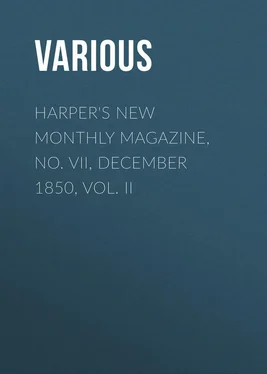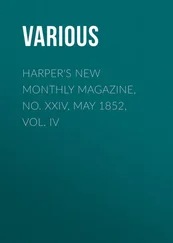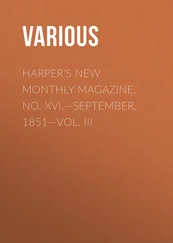Various - Harper's New Monthly Magazine, No. VII, December 1850, Vol. II
Здесь есть возможность читать онлайн «Various - Harper's New Monthly Magazine, No. VII, December 1850, Vol. II» — ознакомительный отрывок электронной книги совершенно бесплатно, а после прочтения отрывка купить полную версию. В некоторых случаях можно слушать аудио, скачать через торрент в формате fb2 и присутствует краткое содержание. Издательство: Иностранный паблик, Жанр: periodic, foreign_edu, на английском языке. Описание произведения, (предисловие) а так же отзывы посетителей доступны на портале библиотеки ЛибКат.
- Название:Harper's New Monthly Magazine, No. VII, December 1850, Vol. II
- Автор:
- Издательство:Иностранный паблик
- Жанр:
- Год:неизвестен
- ISBN:нет данных
- Рейтинг книги:4 / 5. Голосов: 1
-
Избранное:Добавить в избранное
- Отзывы:
-
Ваша оценка:
- 80
- 1
- 2
- 3
- 4
- 5
Harper's New Monthly Magazine, No. VII, December 1850, Vol. II: краткое содержание, описание и аннотация
Предлагаем к чтению аннотацию, описание, краткое содержание или предисловие (зависит от того, что написал сам автор книги «Harper's New Monthly Magazine, No. VII, December 1850, Vol. II»). Если вы не нашли необходимую информацию о книге — напишите в комментариях, мы постараемся отыскать её.
Harper's New Monthly Magazine, No. VII, December 1850, Vol. II — читать онлайн ознакомительный отрывок
Ниже представлен текст книги, разбитый по страницам. Система сохранения места последней прочитанной страницы, позволяет с удобством читать онлайн бесплатно книгу «Harper's New Monthly Magazine, No. VII, December 1850, Vol. II», без необходимости каждый раз заново искать на чём Вы остановились. Поставьте закладку, и сможете в любой момент перейти на страницу, на которой закончили чтение.
Интервал:
Закладка:
Thus to relieve the wretched was his pride,
And even his failings lean'd to virtue's side —
But in his duty, prompt at every call,
He watch'd and wept, he pray'd and felt for all:
And, as a bird each fond endearment tries
To tempt its new-fledg'd offspring to the skies,
He tried each art, reprov'd each dull delay,
Allur'd to brighter worlds, and led the way.
Beside the bed where parting life was laid,
And sorrow, guilt, and pain by turns dismay'd,
The reverend champion stood: at his control
Despair and anguish fled the struggling soul;
Comfort came down the trembling wretch to raise,
And his last faltering accents whisper'd praise.
At church with meek and unaffected grace,
His looks adorn'd the venerable place;
Truth from his lips prevail'd with double sway,
And fools who came to scoff remain'd to pray.
The service pass'd, around the pious man,
With steady zeal, each honest rustic ran;
Even children follow'd, with endearing wile,
And pluck'd his gown, to share the good man's smile:
His ready smile a parent's warmth express'd,
Their welfare pleas'd him, and their cares distress'd.
To them his heart, his love, his griefs were given,
But all his serious thoughts had rest in heaven:
As some tall cliff, that lifts its awful form,
Swells from the vale, and midway leaves the storm
Though round its breast the rolling clouds are spread
Eternal sunshine settles on its head.
Beside yon straggling fence that skirts the way,
With blossom'd furze unprofitably gay —
There, in his noisy mansion, skill'd to rule,
The village master taught his little school.
A man severe he was, and stern to view;
I knew him well, and every truant knew:
Well had the boding tremblers learn'd to trace
The day's disasters in his morning face;
Full well they laugh'd with counterfeited glee
At all his jokes, for many a joke had he;
Full well the busy whisper, circling round,
Convey'd the dismal tidings when he frown'd —
Yet he was kind, or if severe in aught,
The love he bore to learning was in fault.
The village all declar'd how much he knew;
'Twas certain he could write, and cipher too,
Lands he could measure, terms and tides presage —
And even the story ran that he could gauge.
In arguing too, the parson own'd his skill,
For even though vanquish'd he could argue still;
While words of learned length and thundering sound
Amaz'd the gazing rustics rang'd around —
And still they gaz'd, and still the wonder grew
That one small head could carry all he knew.
But pass'd is all his fame: the very spot,
Where many a time he triumph'd, is forgot.
Near yonder thorn, that lifts its head on high,
Where once the sign-post caught the passing eye,
Low lies that house where nut-brown draughts inspir'd.
Where gray-beard mirth and smiling toil retir'd,
Where village statesmen talk'd with looks profound.
And news much older than their ale went round.
Imagination fondly stoops to trace
The parlor splendors of that festive place:
The whitewash'd wall, the nicely sanded floor,
The varnish'd clock that click'd behind the door —
The chest contriv'd a double debt to pay,
A bed by night, a chest of drawers by day —
The pictures plac'd for ornament and use,
The twelve good rules, the royal game of goose —
The hearth, except when winter chill'd the day,
With aspen bows, and flowers, and fennel gay —
While broken tea-cups, wisely kept for show,
Rang'd o'er the chimney, glistened in a row.
Vain, transitory splendors! could not all
Reprieve the tottering mansion from its fall?
Obscure it sinks; nor shall it more impart
An hour's importance to the poor man's heart:
Thither no more the peasant shall repair
To sweet oblivion of his daily care;
No more the farmer's news, the barber's tale,
No more the woodman's ballad shall prevail;
No more the smith his dusky brow shall clear,
Relax his ponderous strength, and lean to hear;
The host himself no longer shall be found
Careful to see the mantling bliss go round;
Nor the coy maid, half willing to be press'd,
Shall kiss the cup to pass it to the rest.
Yes! let the rich deride, the proud disdain,
These simple blessings of the lowly train —
To me more dear, congenial to my heart,
One native charm, than all the gloss of art.
Spontaneous joys, where nature has its play,
The soul adopts, and owns their first-born sway —
Lightly they frolic o'er the vacant mind,
Unenvied, unmolested, unconfin'd;
But the long pomp, the midnight masquerade,
With all the freaks of wanton wealth array'd,
In these, ere triflers half their wish obtain,
The toiling pleasure sickens into pain —
And, even while fashion's brightest arts decoy,
The heart distrusting asks, if this be joy.
Ye friends to truth, ye statesmen who survey
The rich man's joys increase, the poor's decay —
'Tis yours to judge how wide the limits stand
Between a splendid and an happy land
Proud swells the tide with loads of freighted ore,
And shouting folly hails them from her shore;
Hoards even beyond the miser's wish abound,
And rich men flock from all the world around;
Yet count our gains: this wealth is but a name
That leaves our useful product still the same.
Not so the loss. The man of wealth and pride
Takes up a space that many poor supplied —
Space for his lake, his park's extended bounds,
Space for his horses, equipage, and hounds;
The robe that wraps his limbs in silken sloth
Has robbed the neighboring fields of half their growth;
His seat where solitary sports are seen,
Indignant spurns the cottage from the green;
Around the world each needful product flies,
For all the luxuries the world supplies;
While thus the land adorn'd for pleasure – all
In barren splendor feebly waits the fall.
As some fair female unadorn'd and plain,
Secure to please while youth confirms her reign
Slights every borrow'd charm that dress supplies,
Nor shares with art the triumph of her eyes —
But when those charms are pass'd, for charms are frail,
When time advances, and when lovers fail —
She then shines forth, solicitous to bless,
In all the glaring impotence of dress.
Thus fares the land, by luxury betray'd:
In nature's simplest charms at first array'd —
But verging to decline, its splendors rise,
Its vistas strike, its palaces surprise;
While, scourg'd by famine, from the smiling land
The mournful peasant leads his humble band —
And while he sinks, without one arm to save,
The country blooms – a garden and a grave.
Where then, ah! where shall poverty reside,
To 'scape the pressure of contiguous pride?
If to some common's fenceless limits stray'd
He drives his flock to pick the scanty blade,
Those fenceless fields the sons of wealth divide,
And even the bare-worn common is denied.
If to the city sped – what waits him there?
To see profusion that he must not share;
To see ten thousand baneful arts combin'd
To pamper luxury, and thin mankind;
To see those joys the sons of pleasure know,
Extorted from his fellow-creatures' woe:
Here, while the courtier glitters in brocade,
There the pale artist plies the sickly trade;
Here, while the proud their long-drawn pomps display,
There the black gibbet glooms beside the way.
The dome where pleasure holds her midnight reign,
Here, richly deck'd, admits the gorgeous train —
Tumultuous grandeur crowds the blazing square,
The rattling chariots clash, the torches glare.
Sure scenes like these no troubles e'er annoy:
Sure these denote one universal joy!
Are these thy serious thoughts? – ah! turn thine eyes
Where the poor houseless shivering female lies.
She once, perhaps, in village plenty bless'd,
Has wept at tales of innocence distress'd —
Her modest looks the cottage might adorn,
Sweet as the primrose peeps beneath the thorn;
Now lost to all – her friends, her virtue fled,
Near her betrayer's door she lays her head —
And, pinch'd with cold, and shrinking from the shower,
With heavy heart deplores that luckless hour
When idly first, ambitious of the town,
She left her wheel, and robes of country brown.
Do thine, sweet Auburn! thine, the loveliest train,
Do thy fair tribes participate her pain?
Even now, perhaps, by cold and hunger led,
At proud men's doors they ask a little bread.
Ah, no! To distant climes, a dreary scene,
Where half the convex world intrudes between,
Through torrid tracts with fainting steps they go,
Where wild Altama murmurs to their woe.
Far different there from all that charm'd before,
The various terrors of that horrid shore;
Those blazing suns that dart a downward ray,
And fiercely shed intolerable day —
Those matted woods where birds forget to sing
But silent bats in drowsy clusters cling —
Those poisonous fields with rank luxuriance crown'd
Where the dark scorpion gathers death around —
Where at each step the stranger fears to wake
The rattling terrors of the vengeful snake —
Where crouching tigers wait their hapless prey,
And savage men more murderous still than they —
While oft in whirls the mad tornado flies,
Mingling the ravag'd landscape with the skies.
Far different these from every former scene;
The cooling brook, the grassy-vested green,
The breezy covert of the warbling grove,
That only shelter'd thefts of harmless love.
Good Heaven! what sorrows gloom'd that parting day,
That call'd them from their native walks away,
When the poor exiles, every pleasure pass'd,
Hung round their bowers, and fondly look'd their last,
And took a long farewell, and wish'd in vain
For seats like these beyond the western main —
And shuddering still to face the distant deep,
Return'd and wept, and still return'd to weep.
The good old sire, the first, prepar'd to go
To new-found worlds, and wept for others' woe —
But for himself, in conscious virtue brave,
He only wish'd for worlds beyond the grave;
His lovely daughter, lovelier in her tears,
The fond companion of his helpless years,
Silent went next, neglectful of her charms,
And left a lover's for a father's arms;
With louder plaints the mother spoke her woes,
And bless'd the cot where every pleasure rose,
And kiss'd her thoughtless babes with many a tear,
And clasp'd them close, in sorrow doubly dear —
While her fond husband strove to lend relief
In all the silent manliness of grief.
O luxury! thou curs'd by Heaven's decree,
How ill exchang'd are things like these for thee;
How do thy potions, with insidious joy,
Diffuse their pleasures only to destroy!
Kingdoms by thee, to sickly greatness grown,
Boast of a florid vigor not their own;
At every draught more large and large they grow,
A bloated mass of rank, unwieldy woe —
Till sapp'd their strength, and every part unsound,
Down, down they sink, and spread a ruin round.
Even now the devastation is begun,
And half the business of destruction done;
Even now, methinks, as pondering here I stand,
I see the rural virtues leave the land;
Down, where yon anchoring vessel spreads the sail,
That idly waiting flaps with every gale,
Downward they move – a melancholy band —
Pass from the shore, and darken all the strand,
Contented Toil and hospitable Care,
And kind connubial Tenderness, are there —
And Piety with wishes plac'd above,
And steady Loyalty, and faithful Love.
And thou, sweet Poetry! thou loveliest maid,
Still first to fly where sensual joys invade,
Unfit in these degenerate times of shame
To catch the heart, or strike for honest fame —
Dear, charming nymph, neglected and decried,
My shame in crowds, my solitary pride —
Thou source of all my bliss, and all my woe,
That found'st me poor at first, and keep'st me so —
Thou guide by which the nobler arts excel,
Thou nurse of every virtue – fare thee well.
Farewell! and oh! where'er thy voice be tried,
On Tornea's cliffs or Pambamarca's side,
Whether where equinoctial fervors glow,
Or winter wraps the polar world in snow,
Still let thy voice, prevailing over time,
Redress the rigors of the inclement clime.
Aid slighted Truth: with thy persuasive strain
Teach erring man to spurn the rage of gain;
Teach him, that states of native strength possess'd,
Though very poor, may still be very bless'd;
That trade's proud empire hastes to swift decay,
As ocean sweeps the labor'd mole away —
While self-dependent power can time defy,
As rocks resist the billows and the sky.
Читать дальше
Интервал:
Закладка:
Похожие книги на «Harper's New Monthly Magazine, No. VII, December 1850, Vol. II»
Представляем Вашему вниманию похожие книги на «Harper's New Monthly Magazine, No. VII, December 1850, Vol. II» списком для выбора. Мы отобрали схожую по названию и смыслу литературу в надежде предоставить читателям больше вариантов отыскать новые, интересные, ещё непрочитанные произведения.
Обсуждение, отзывы о книге «Harper's New Monthly Magazine, No. VII, December 1850, Vol. II» и просто собственные мнения читателей. Оставьте ваши комментарии, напишите, что Вы думаете о произведении, его смысле или главных героях. Укажите что конкретно понравилось, а что нет, и почему Вы так считаете.












